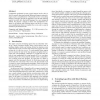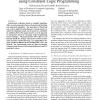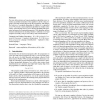906 search results - page 23 / 182 » Language and program design for functional dependencies |
PEPM
2009
ACM
14 years 7 months ago
2009
ACM
Computation performed in many typical aspects involve side effects. In a purely functional setting, adding such aspects using techniques such as monadification will generally lea...
PLDI
2004
ACM
14 years 4 months ago
2004
ACM
Although dynamic program slicing was first introduced to aid in user level debugging, applications aimed at improving software quality, reliability, security, and performance hav...
IFIP
2001
Springer
14 years 3 months ago
2001
Springer
— Semi-formal verification based on symbolic simulation offers a good compromise between formal model checking and numerical simulation. The generation of functional test vector...
POPL
2009
ACM
14 years 11 months ago
2009
ACM
Previous deforestation and supercompilation algorithms may introduce accidental termination when applied to call-by-value programs. This hides looping bugs from the programmer, an...
PLDI
2000
ACM
14 years 2 months ago
2000
ACM
Functional Reactive Programming, or FRP, is a general framework for programming hybrid systems in a high-level, declarative manner. The key ideas in FRP are its notions of behavio...




